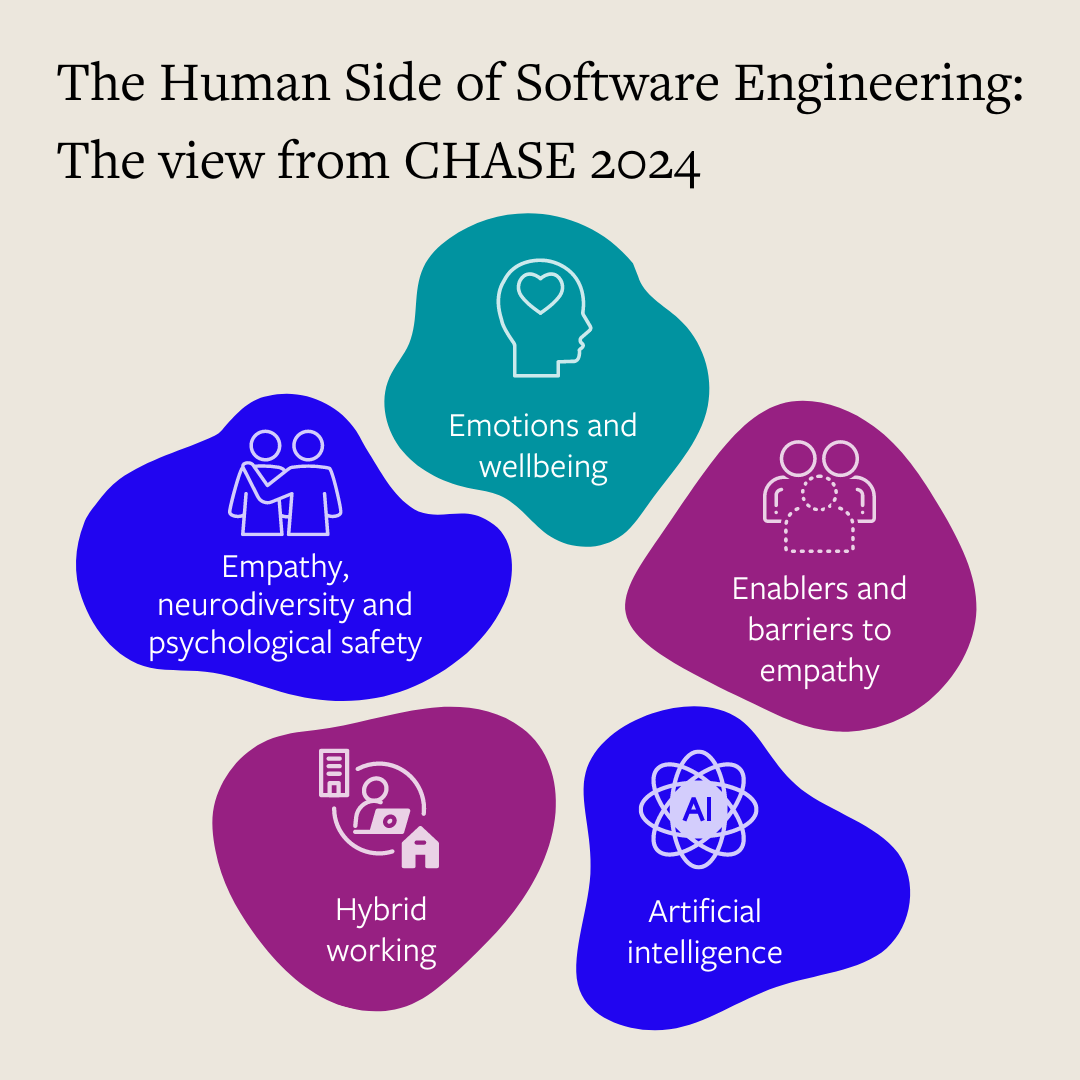This blog from the Agile Research Network (ARN) summarises some insights from the CHASE conference (Co-operative and Human Aspects of Software Engineering; https://conf.researchr.org/home/chase-2024), held in Lisbon on 15th April 2024, and co-located with ICSE (International Conference on Software Engineering). In 2024 ICSE attracted over 2200 participants from 63 countries.
CHASE is the premier venue for research on cooperative and human aspects of software engineering, attracting both academics and practitioners. Since its beginnings as a workshop in 2008, the CHASE conference has provided a forum to discuss research that focuses on people. Although the importance of people in software engineering has been written about for many years (e.g. DeMarco and Lister (1987) and Nygaard (1986)), these issues have not been widely discussed in the mainstream software engineering research community. CHASE has always attracted a dedicated community and in 2021 it evolved from a workshop aimed at strengthening the community into a conference intended to present the latest thinking on CHASE topics (chaseresearch.org).
Insights
-
Emotions and wellbeing: The first keynote at CHASE (from Nicole Novielli, Associate Professor of Computer Science, University of Bari, Italy) focused on software developers’ emotions. Professor Novielli summarised research into how emotions affect productivity, and considered how to increase emotional awareness for individuals and teams, hence promoting wellbeing. Wellbeing is another subject that has received much attention in the software engineering community in the last few years, prompted initially by the COVID pandemic.
-
Empathy, neurodiversity and psychological safety: Several papers and presentations considered the impact on individuals and teams of empathy, emotions, neurodiversity and psychological safety. The theme of diversity was present at CHASE in 2023 but was much more visible this year and was discussed in relation to team composition but also in relation to its effect on creativity, on the software itself and on its users.
-
Hybrid working: One paper presented a literature review seeking out research focused on the impact of hybrid work in agile software development contexts, while another focused on the factors that influence developers’ choice of remote versus in-office and hybrid working arrangements. This is clearly a topic that will be of continued interest to organisations and individuals alike.
-
Artificial intelligence (AI): The role of AI and its impact on software development from the human perspective was another common theme running throughout CHASE and the wider ICSE conference. One paper talked about ethics and how aware developers may be of the ethical decisions that developing software involves. Several papers discussed the consequences of AI-based tools for human developers and whether studying social aspects would still be relevant in years to come. The answer was a resounding YES!
-
Enablers and barriers to empathy: One paper discussed which factors enabled and what hindered empathy for software developers. This sparked a debate around the difference between empathy and lived experience. Quite a lot is spoken about the need to empathise with users and teammates, and various techniques have been suggested that might allow someone to empathise with another’s perspective. However, can anyone who is not directly experiencing a situation really develop empathy?
The term “lived experience” is used to capture the notion that living with or in a situation produces different insights than simply “empathising” with it. The implication of this from a business point of view is that it is vital to engage more effectively with colleagues and those who will be actually using their services or products. This is not a surprising message for business agilists, who take a customer-centric point of view, but switching the terminology to perhaps recognise that some experiences are harder to empathise with than others, provides a new perspective.
It’s interesting to observe that while the conference focus was software engineering, many of the themes and insights are relevant across other business functions too.
As a reader, what lessons can you take away from this research and apply within your own workplace, regardless of function or business?
References
DeMarco, Tom and Lister, Tim (1987) Peopleware: Productive Projects and Teams. New York: Dorset House.
Nygaard, Kristen (1986) Program Development as a Social Activity, Information Processing 86 H.-J. Kugler (ed) Elsevier Publishers B.V. (North Holland), IFIP, Proceedings from the IFIP 10th World Computer Congress, Dublin, Ireland, pp189-198.
Further reading:
The role of AI in project management: opportunities and challenges (agilebusiness.org)
Building an Agile Culture Through Trust (agilebusiness.org)
Collaborative Communities – The New Normal? (agilebusiness.org)
Video: Mehmet Baha - Creating Psychological Safety in Your Teams (agilebusiness.org)
Please note blogs reflect the opinions of their authors and do not necessarily reflect the recommendations or guidance of the Agile Business Consortium.




